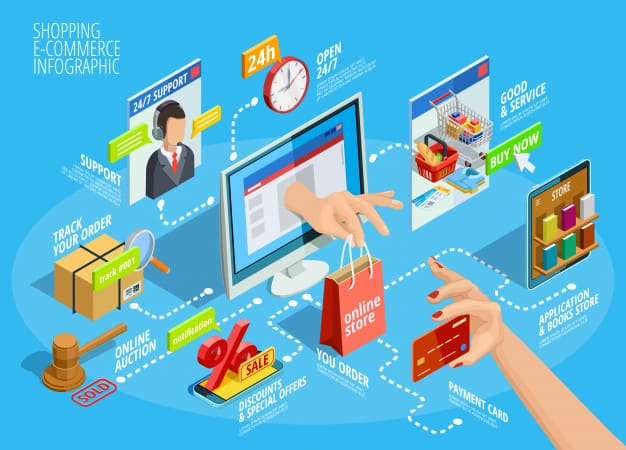
Subscribe for Free!
Join our newsletter to explore innovative sustainability initiatives, eco-friendly tips, and impactful activities

Join our newsletter to explore innovative sustainability initiatives, eco-friendly tips, and impactful activities
E-Commerce in Algeria
April 22, 2021

The global economy has undergone significant changes, mainly due to the increasing impact of globalization. Today, we talk about the new digital economy, which has become an international sales force, especially in advanced countries, although it is a new concept in Algeria.
E-commerce encompasses all commercial transactions carried out remotely through electronic and digital interfaces.
It mainly includes commercial transactions conducted over the Internet using various types of devices (computers, tablets, smartphones, consoles, connected TVs) on e-commerce websites or mobile merchant applications.
1-Different Types of Relationships in E-Commerce:
E-commerce activities revolve around three main entities: businesses, governments, and individuals (consumers). The relationships between these entities can be classified as follows:
1. B to B (business to business) :
This refers to electronic commerce between businesses, involving electronic transactions between two or more companies to facilitate the exchange of products, services, and information.
2. B to C (Business to Consumer) :
This refers to electronic commerce from businesses to consumers, involving electronic transactions between a business and a consumer. This type of exchange is perhaps the most viable aspect of e-commerce, as it allows consumers to buy goods and services directly on the Internet for personal use.
3. B to A (Business to Administration) :
This refers to electronic commerce from businesses to government administrations, involving electronic transactions between a business and a government administration, such as submitting a tax return to a ministry.
4. C to C (Consumer to Consumer) :
This refers to electronic commerce between consumers, also known as "consumer-to-consumer exchanges." It applies to commercial exchanges between private individuals, with a specialized merchant website acting as an intermediary.
- The Internet eliminates intermediaries and multiple procedures between the business and the consumer (direct contact).
- It promotes interactivity by developing a personal relationship with the consumer or client, facilitating sales.
- The free entry into the electronic market allows small businesses to compete with large traditional companies.
- Websites are available 24/7.
- Precise information on products, prices, and answers to consumer questions.
- The ability to search for the best price.
- Discovering new products.

1) The Reality of E-Commerce in Algeria:
Algerian society has gradually opened up to the world of new information and communication technologies. Algeria is currently experiencing technological growth and is starting to adapt to various technological aspects (Internet, smartphones, tablets, computers, etc.).
Despite the absence of online payment, e-commerce websites are multiplying in Algeria. However, this sector is becoming professional under the impetus of Algerian and foreign entrepreneurs betting on the rapid expansion of this new market. The first Algerian e-commerce site was created in 2010 (Guidinni.com), followed by several other sites, such as eChrily.com, which is one of the pioneering online sales sites created in July 2012.
2) The Electronic Payment System in Algeria:
Despite Algeria's considerable delay in the field of electronic payment, its launch has been postponed several times. The electronic payment service was officially launched on October 4, 2016, primarily involving the use of the CIB card through a network composed of eight shareholders, including banks and financial institutions: Al Baraka, BADR, BDL, BEA, BNA, CNEP banks, CNMA, CPA, and other members such as Algeria Post, ABC, AGB, Arab Bank, BNP PARIBAS…
3) Payment Methods in E-Commerce in Algeria:
3.1 Bank Transfer:
A bank transfer is a fund transfer operation from one account to another, conducted electronically between two bank accounts.
3.2 Postal Money Order:
Payment by postal money order is carried out at the post office and in all Algerian post offices, addressed in the name of the website.
3.3 Cash on Delivery:
The buyer pays the purchase invoice upon receipt of the package.
3.4 Epay.dz:
This is the first data processing site related to online payment in Algeria. This system allows the use of a prepaid card to buy and sell online or pay bills without moving. Epay.dz charges a commission of 3 to 5% on each transaction.
Today, technology continues to develop at an astonishing pace. Technological innovations are increasingly demonstrating their effectiveness. These innovations, especially the Internet, continue to conquer all fields and bring about their magical effects. Algeria is currently experiencing technological growth and has opened its doors to e-commerce. However, numerous indicators reveal that this new practice is not yet well-developed and little used in the country. The reasons for this delay include a legal vacuum that needs to be filled, a lack of expertise in the field of e-commerce, an incompatible banking system, and the reluctance of Algerian consumers to give up their traditional consumption habits and follow the evolving trend of e-commerce.
To address this situation, the Algerian state and businesses must take measures to promote this type of commerce, such as encouraging the creation of e-commerce businesses, establishing a legal framework, modernizing the banking system... , Algerian e-commerce could become a significant driver of national economic growth.